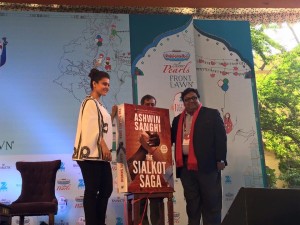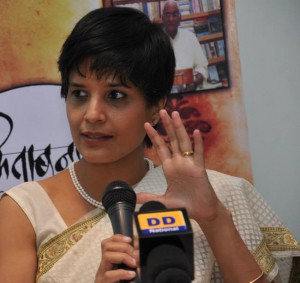Ashwin Sanghi, “The Sialkot Saga”

Bollywood actress, Kajol, and Ashwin Sanghi unveiling the book cover of “The Sialkot Saga” at Jaipur Literature Festival 2016.
Some animals hunt. Others hide. And a few hunt while they hide.
Ashwin Sanghi’s latest novel The Sialkot Saga will be released on 5 April 2016. It is a greatly anticipated thriller whose cover was unveiled with great fanfare by the Bollywood actress, Kajol Devgn, at Jaipur Literature Festival 2016. The Sialkot Saga is a retelling of modern Indian history through the lives of a Muslim Mumbai underworld don, Arbaaz Sheikh, and a Hindu Calcutta Marwari businessman, Arvind Bagadia. Basic premise being money matters, nothing else — it is a dhanda after all. As is the fashion nowadays in modern novels a family saga spread across at least two generations is a must and is evident in Sialkot Saga too. There are neat historical details beginning with Partition interspersed with brutal violence and unscrupulous plans to gain money. Politics, land deals, hawala, narcotics, films etc. Anything as long as there is a healthy profit margin to be made. There are some descriptions of violence particularly horrifying since they challenge the boundaries of ethics. But the acts described are so very plausible that the horror is compounded manifold. It strikes a sense of fear. Surprisingly the boldness of these criminal minds also makes one chuckle. 300-odd pages into the novel it begins to seem like a manual on the rise of corporate India. It becomes a little convoluted with its business descriptions. An account of the birth of companies like Reliance, Satyam, Infosys to the formidable place they hold today as the gems of Shining & Incredible India. The chorus of the opening pages soon to be forgotten as the plot builds is “Some animals hunt. Others hide. And a few hunt while they hide.” Attention does begin to flag but every writer writes from their strong point and being a successful businessman is one of Ashwin Sanghi’s strengths.
The second is his avatar as a modern mythographer. It is evident in the tenuous tale he weaves about the sanjeevani. It seems a bit convenient but once again it is Ashwin Sanghi’s forte to pull together myths and present them in a modern setting. It is his trademark. And one that his many readers will be waiting for. ( Till date he has sold over a million units of his previous books.)
Here is the link to the book trailer: https://youtu.be/1qv_tk5i9kM . It is a wonderfully edited movie clip but is not true to the book at all.
Undoubtedly Ashwin Sanghi’s “Sialkot Saga” is immensely readable for its tremendous insight into the Indian brand of businessmen. There is no word for their inventiveness in their greed for money and this is matched by the phenomenal storytelling of the novelist. It is quite remarkable. Setting his story in the historical backdrop of modern India proves that irrespective of political ideologies and government policies, money always wins. Having said that there is a lot of testosterone flowing through this book with the few women characters taking on fairly conventional roles. Even the breakaway character of Alisha as an example of the millennial generation does not quite live up to promise. I am not even going to nitpick about historical accuracy since it does not purport to be a historical novel. It is just a great story.
Read it!
Ashwin Sanghi The Sialkot Saga Westland, Chennai, 2016. Pb. pp. 584. Rs 350
31 March 2016



